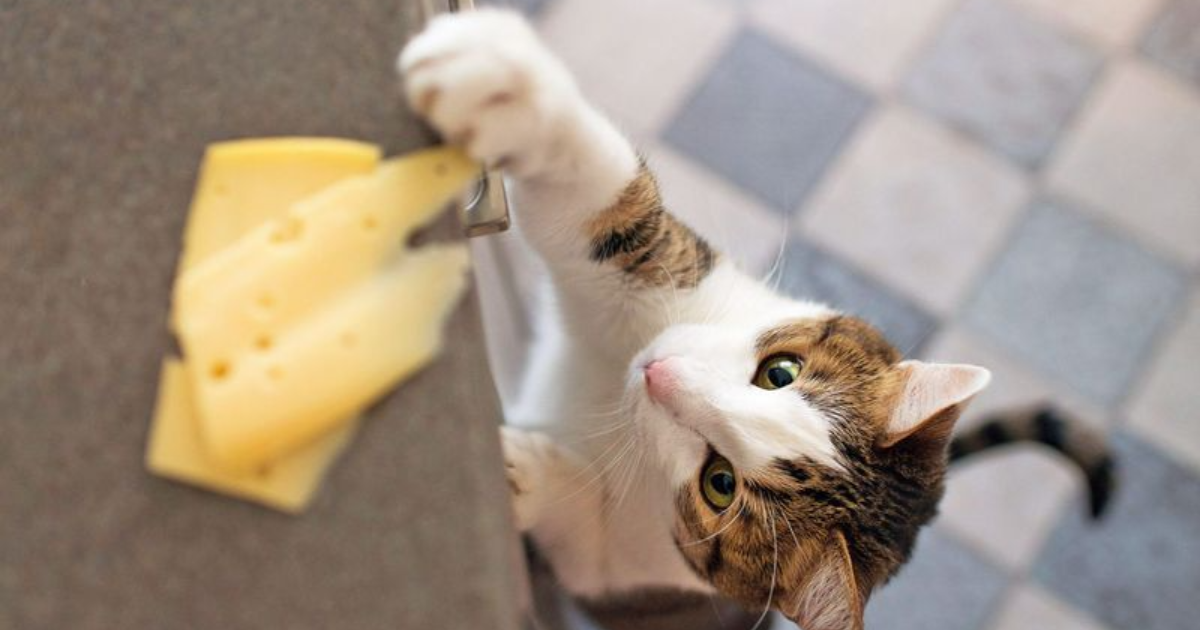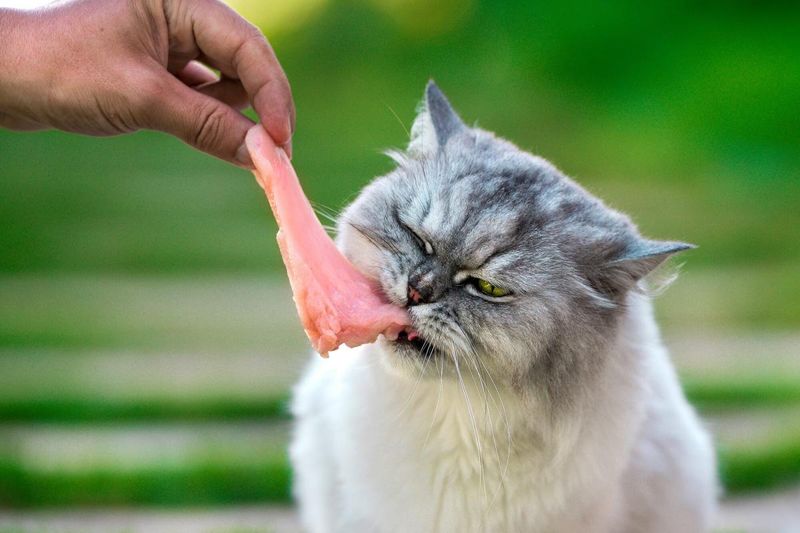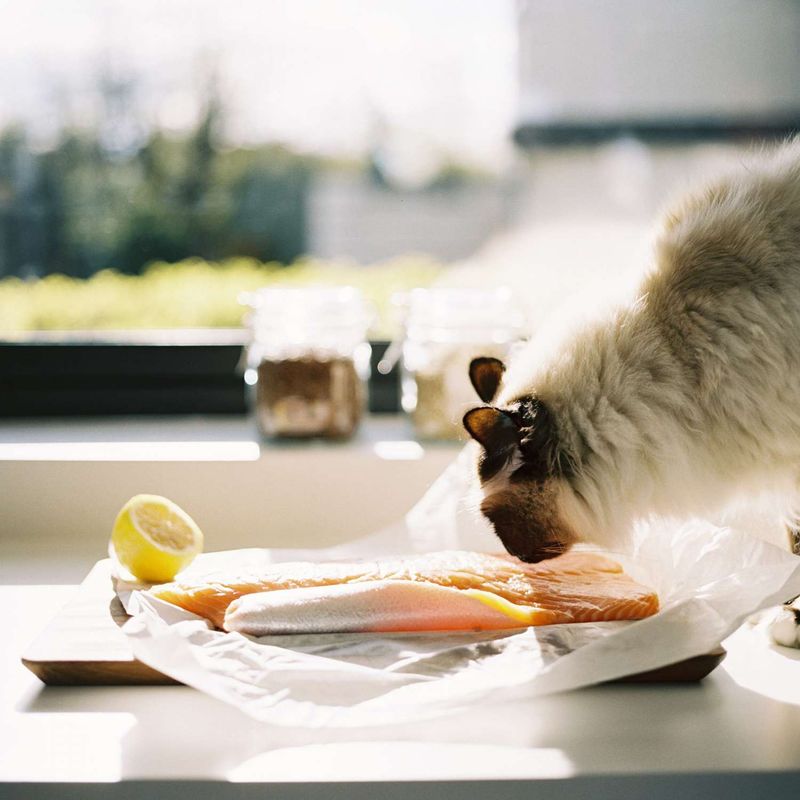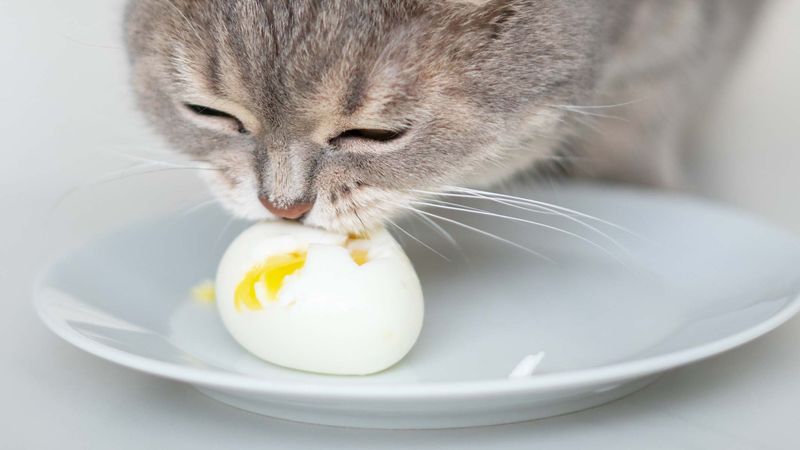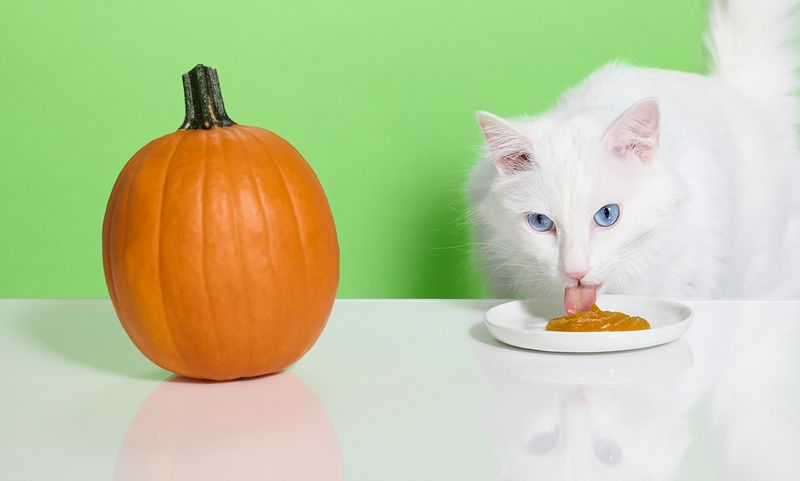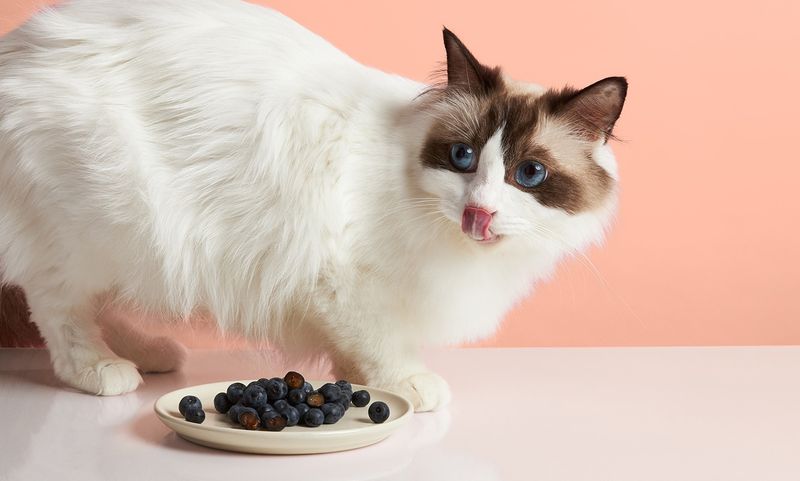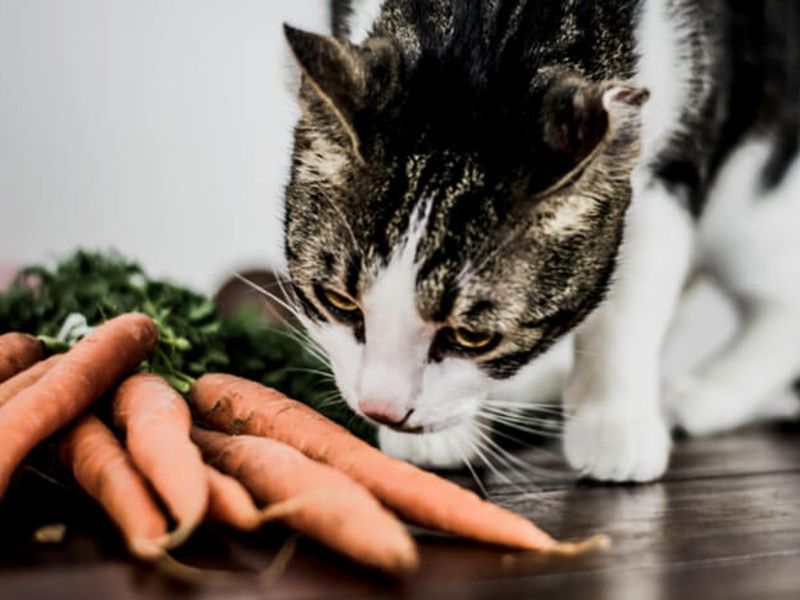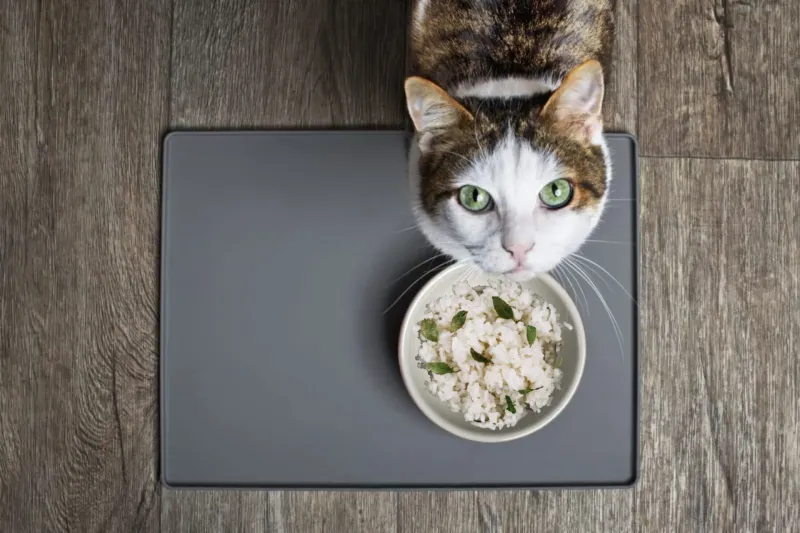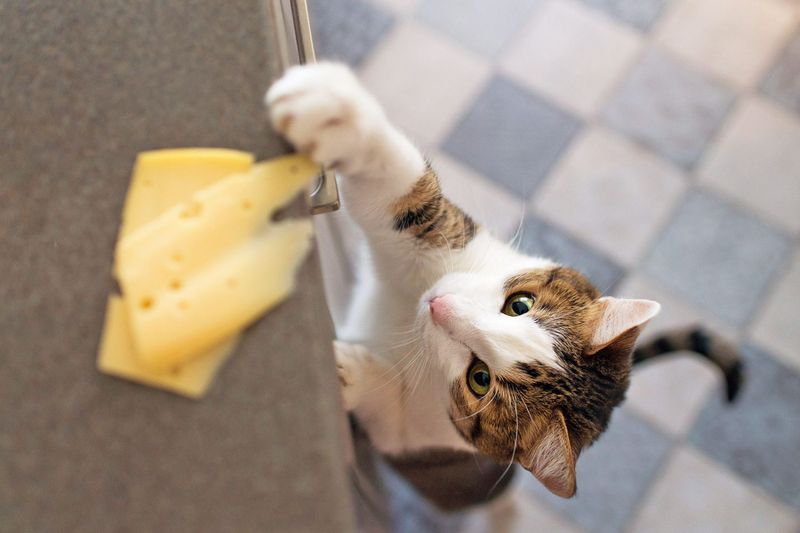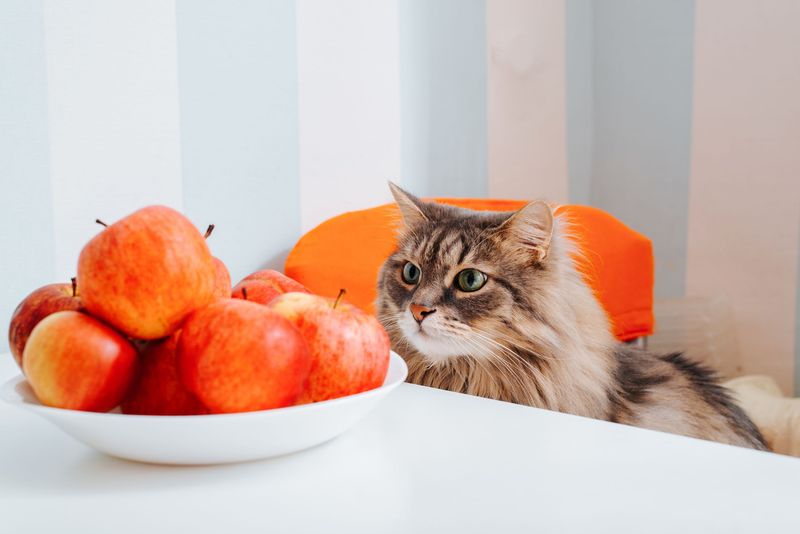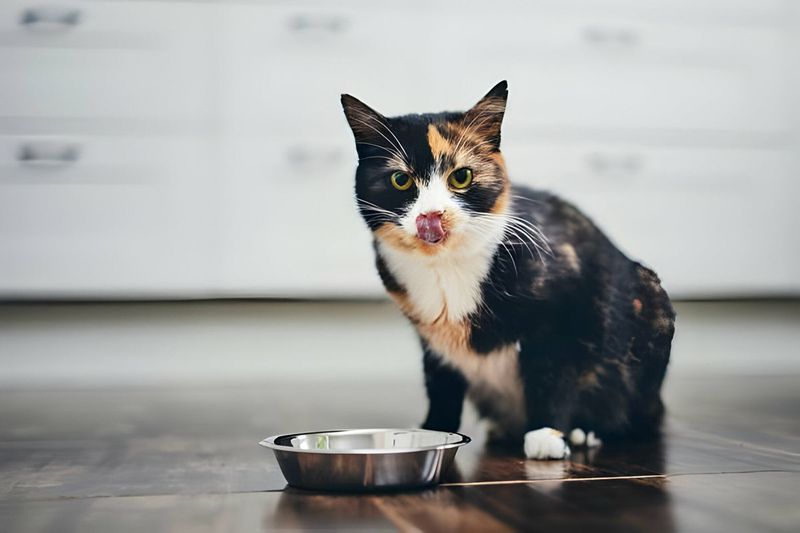📖 Table of Content:
While cats are obligate carnivores requiring specialized diets rich in proteins, there are certain human foods that can occasionally be shared with your feline friend.
Introducing these foods in moderation can provide variety and even some nutritional benefits. However, it’s important to ensure these foods are safe and suitable for cats, as their digestive systems differ significantly from humans.
Here’s a list of 10 surprising human foods that are safe for cats when given in small quantities.
10. Cooked Chicken
Cats are naturally attracted to the savory aroma of cooked chicken, making it an enticing treat. This lean meat is packed with protein, essential for maintaining strong muscles and overall health. When offering chicken to your cat, ensure it’s thoroughly cooked but free from any seasonings or additives.
Spices like garlic and onion are toxic to cats, so plain is best. Additionally, remove any bones, as they can splinter and pose a choking hazard.
Occasional servings of cooked chicken can complement your cat’s regular diet, but remember to limit the portion size. Too much could upset their digestive system. A small, weekly treat can provide a delightful change of pace for your feline friend.
9. Salmon
Salmon is a flavorful fish that many cats find irresistible. Rich in omega-3 fatty acids, it supports healthy skin and a shiny coat. When offering salmon to your cat, ensure it’s cooked without any spices or sauces, as these can be harmful.
Raw salmon might contain parasites, so cooking is essential to make it safe. Make sure to debone the fillet before serving, as bones can be dangerous for cats.
A small piece of salmon can serve as an occasional treat, adding variety to your cat’s diet. It can also provide essential nutrients that might be missing from standard cat food. Always feed in moderation to avoid digestive issues.
8. Eggs
Eggs are a powerhouse of nutrition and can be a delightful treat for your cat. Rich in protein and amino acids, they support muscle maintenance and overall health. It’s crucial to serve eggs cooked, as raw eggs pose a risk of salmonella, which can affect both cats and humans.
Scrambled or boiled eggs make for a suitable preparation method, but avoid adding salt, pepper, or any spices. Introduce eggs sparingly into your cat’s diet, ensuring the portion size is small.
Regularly feeding eggs is not recommended due to their high calorie content, but as an infrequent treat, they offer a healthy boost. Your cat will likely enjoy this tasty change.
7. Pumpkin
Pumpkin is not only a festive favorite for humans but also beneficial for cats. It’s rich in fiber, which aids in digestion and helps alleviate constipation. Canned pumpkin puree (not pie filling with spices) is safe to give in small amounts.
Adding a spoonful of pumpkin to your cat’s food can improve digestive health, especially in cats with sensitive stomachs. The natural sweetness and texture are usually appealing.
As with any treat, moderation is key. Overconsumption can lead to gastrointestinal upset. Introduce pumpkin gradually, observing for any adverse reactions. This bright orange treat can be a nutritious addition to your cat’s diet during the fall season.
6. Blueberries
Blueberries are a surprising yet healthy treat that many cats enjoy. These tiny berries are packed with antioxidants, which help support the immune system and fight inflammation. Offering a few fresh berries as a snack can be both fun and nutritious.
Make sure to wash the blueberries thoroughly to remove any pesticides or residues. Some cats might not immediately take to the slightly tart flavor, so patience is key.
Blueberries should be an occasional treat due to their sugar content. A few berries a week can provide a nice change from typical cat treats. Monitor your cat’s reaction and discontinue if any digestive issues arise.
5. Carrots
Carrots are colorful, crunchy, and surprisingly safe for cats when cooked. Rich in beta-carotene, which converts to vitamin A, they help maintain healthy eyes and skin. However, raw carrots can be too hard, so always cook them until soft.
Steam or boil the carrots without any added salt or spices. Once cooled, cut them into small, manageable pieces. A few slices can add variety and a little nutritional boost to your cat’s meal.
Offering cooked carrots occasionally can be a healthy snack. Remember, moderation is critical to prevent any digestive discomfort. Most cats enjoy the new texture and taste, making it a successful treat.
4. Rice
Rice is a staple food in many human diets and can be safely shared with cats in moderation. Plain, cooked white rice can be especially beneficial for cats with digestive issues, as it is gentle on the stomach.
Avoid any seasonings or additives, and serve the rice plain. This bland food can act as a binding agent for cats experiencing diarrhea.
While rice can be a helpful temporary addition to your cat’s diet, it should not replace their regular meals. Offer it occasionally and in small portions to ensure it doesn’t disrupt their nutrient intake. Cats may enjoy this simple yet effective treat.
3. Cheese
Cheese is a delightful treat that many cats find irresistible. It’s rich in calcium and protein, which support bone health and muscle maintenance. However, it’s essential to serve cheese in small quantities, as many cats are lactose intolerant.
Opt for hard cheeses like cheddar or Swiss, which contain less lactose compared to soft cheeses. Introduce cheese cautiously, watching for any signs of digestive upset.
Cheese can serve as an occasional reward or training treat. Limit the portion size to a cube or two, as overconsumption can lead to stomach issues. This creamy delight can add excitement to your cat’s treat routine.
2. Apples
Apples are a crisp and refreshing treat that cats can enjoy in moderation. They provide fiber and vitamin C, promoting digestive health and immunity. Ensure apples are peeled and cored, as seeds contain cyanide, which is toxic to cats.
Offer small, bite-sized pieces that your cat can easily munch on. The natural sweetness is likely to appeal to their taste buds.
Introduce apples slowly, monitoring for any adverse reactions. While nutritious, they should only be an occasional snack due to their sugar content. A slice or two can provide a delightful and healthy break from usual cat treats.
1. Peas
Peas are small, green, and surprisingly appealing to many cats. They’re packed with vitamins A, B, and K, along with dietary fiber, which supports overall health. Fresh or frozen peas, cooked without additives, are safe to offer.
Cats often enjoy batting peas around before eating, making them a fun snack. Ensure they’re thoroughly cooked to avoid choking hazards.
Introduce peas gradually to your cat’s diet, and limit servings to a few pieces. They make for a great occasional treat, adding both flavor and nutrition. Keep an eye out for any digestive changes, and discontinue if necessary. Peas can be a playful and healthy addition to your cat’s snack repertoire.
